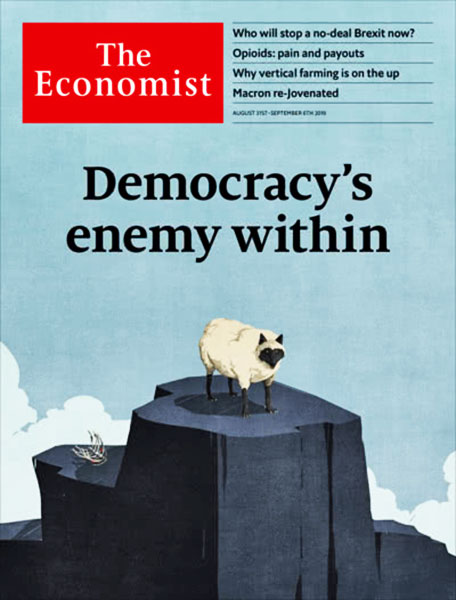|
at Western 'democracies'...
As our briefing explains, the prime minister, Viktor Orban, does not have to break the law, because he can get parliament to change it instead.
He does not need secret police to take his enemies away in the night. They can be cut down to size without violence, by the tame press or the taxman.
In form, Hungary is a thriving democracy; in spirit, it is a one-party state. The forces at work in Hungary are eating away at other 21st-century polities, too.
This is happening not just in young democracies like Poland, where the Law and Justice party has set out to mimic Fidesz, but even the longest-standing ones like,
These old-established
polities are not about to become one-party states, but they are
already showing signs of decay. Once the rot sets in, it is
formidably hard to stop.
After the head of a socialist government popularly seen as corrupt admitted that he had lied to the electorate in 2006, voters learned to assume the worst of their politicians. Orban has enthusiastically exploited this tendency.
Rather than appeal to his compatriots' better nature, he sows division, stokes resentment and exploits their prejudices, especially over immigration.
This political theatre is
designed to be a distraction from his real purpose,
the artful manipulation of obscure rules and institutions to
guarantee his hold on power.
The financial crisis persuaded voters that they were governed by aloof, incompetent, self-serving elites.
In a survey last year, over half of voters from eight countries in Europe and North America told the Pew Research Centre that they were dissatisfied with how democracy is working.
In America Donald Trump told four progressive congresswomen to,
In Israel Binyamin Netanyahu, a consummate insider, portrays official inquiries into his alleged corruption as part of an establishment conspiracy against his premiership.
In Britain Boris
Johnson, lacking support among mps for a
no-deal Brexit, has outraged
his opponents by manipulating procedure to suspend Parliament for
five crucial weeks.
Trump endorses his voters' contempt for Washington by treating opponents as fools or, if they dare stand on honor or principle, as lying hypocrites - an attitude increasingly mirrored on the left.
Britain's Brexiteers and Remainers denigrate each other as immoral, driving politics to the extremes because compromising with the enemy is treachery.
Matteo Salvini, leader of Italy's Northern League, responds to complaints about immigration by cutting space in shelters, in the knowledge that migrants living on the streets will aggravate discontent.
Orban has less than half
the vote but all the power - and behaves that way. By ensuring that
his opponents have no stake in democracy, he encourages them to
express their anger by non-democratic means.
Politics used to behave like a pendulum...
When the right made mistakes the left won its turn, before power swung back rightward again.
Now it looks more like a helter-skelter...
Bad turns to worse...
Moreover, "democracies" can renew themselves.
American politics was
coming apart in the era of the Weathermen and Watergate,
but returned to health in the 1980s.
Democracy is "precious," and those who are 'lucky' enough to have inherited one, must strive to protect it.
NOTE:
This article appeared in the 'Leaders section' of the print edition under the headline "Democracy's enemy within"
|



